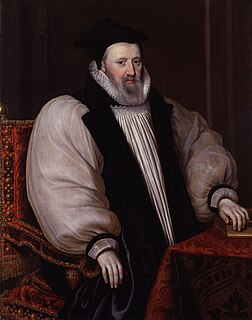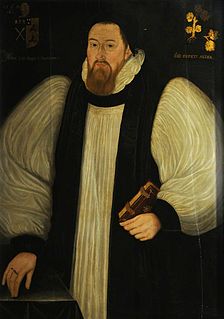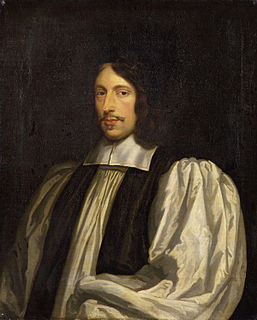
George Abbot was an English divine who was Archbishop of Canterbury from 1611 to 1633. He also served as the fourth Chancellor of Trinity College, Dublin, from 1612 to 1633.

John Donne was an English poet, scholar, soldier and secretary born into a recusant family, who later became a cleric in the Church of England. Under royal patronage, he was made Dean of St Paul's Cathedral in London (1621–1631). He is considered the preeminent representative of the metaphysical poets. His poetical works are noted for their metaphorical and sensual style and include sonnets, love poems, religious poems, Latin translations, epigrams, elegies, songs, and satires. He is also known for his sermons.

William Juxon was an English churchman, Bishop of London from 1633 to 1646 and Archbishop of Canterbury from 1660 until his death.

Francis Godwin (1562–1633) was an English historian, science fiction author, divine, Bishop of Llandaff and of Hereford.
The Master of the Buckhounds was an officer in the Master of the Horse's department of the British Royal Household. The holder was also His/Her Majesty's Representative at Ascot. The role was to oversee a hunting pack; a buckhound is smaller than a staghound and used for coursing the smaller breeds of deer, especially fallow deer. The position was abolished by the Civil List Act 1901.

Nathaniel Crew, 3rd Baron Crew was Bishop of Oxford from 1671 to 1674, then Bishop of Durham from 1674 to 1721. As such he was one of the longest serving bishops of the Church of England.

Thomas Bailey or Bayly was a seventeenth-century English religious controversialist, a Royalist Church of England clergyman who converted to Roman Catholicism.

Clan Bruce is a Lowlands clan. It was a Royal House in the 14th century, producing two kings of Scotland, and a disputed High King of Ireland, Edward Bruce.
Richard Baylie was twice President of St John's College, Oxford, twice Vice-Chancellor of Oxford University, Archdeacon of Nottingham and Dean of the Salisbury Cathedral.
Sir Christopher Alan Bayly, FBA, FRSL was a British historian specialising in British Imperial, Indian and global history. From 1992 to 2013, he was Vere Harmsworth Professor of Imperial and Naval History at the University of Cambridge.
John Phillips was the Anglican Bishop of Sodor and Man between 1604 and 1633. He is best known for writing the first dateable text in the Manx language in his translation of the 1604 Book of Common Prayer in 1610.
Events from the 1630s in England.

First Church in Boston is a Unitarian Universalist Church founded in 1630 by John Winthrop's original Puritan settlement in Boston, Massachusetts. The current building, located on 66 Marlborough Street in the Back Bay neighborhood, was designed by Paul Rudolph in a modernist style after a fire in 1968. It incorporates part of the earlier gothic revival building designed by William Robert Ware and Henry Van Brunt in 1867. The church has long been associated with Harvard University.
Augustine Lindsell was an English classical scholar and Bishop of Hereford. In church matters he was advanced by Richard Neile, and was a firm supporter of William Laud. As a scholar he influenced Thomas Farnaby.
William Paul was an English royal chaplain and bishop of Oxford.

John Hall (1633–1710) was an English churchman and academic, Master of Pembroke College, Oxford, and Bishop of Bristol. He was known as the last of the English bishops to hold to traditional Puritan views.
John Towers was an English churchman, Bishop of Peterborough from 1639, a royalist and a supporter of the ecclesiastical policies of William Laud.
John Humphrey was an English Puritan and an early funder of the English colonisation of North America. He was the treasurer of the Dorchester Company, which established an unsuccessful settlement on Massachusetts Bay in the 1620s, and was deputy governor of the Massachusetts Bay Company from 1629 to 1630. He came to Massachusetts in 1634, where he served as a magistrate and was the first sergeant major general of the Ancient and Honorable Artillery Company. He became involved in English attempts to settle Providencia Island in the late 1630s, and returned to England in 1641 after financial reverses and probable religious differences with other members of the Massachusetts ruling elite. He then became involved in an attempt to settle The Bahamas in the late 1640s, and had some involvement in the politics of the English Civil War.
Edward Drew was an Anglican priest in England during the late 17th and early 18th centuries.








